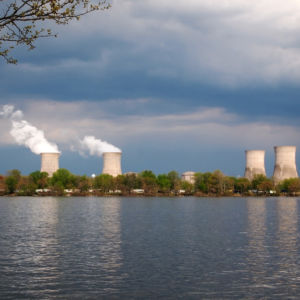For months, state legislatures and the energy industry watched Washington to see if President Trump would make good on his campaign promises to subsidize coal and nuclear plants. With no legislation forthcoming, however, states are taking matters into their own hands by developing subsidy plans of their own. Pennsylvania is the latest state to do so, introducing a bill to subsidize nuclear power. It’s a proposal that has proven controversial not only with Pennsylvania’s fracking industry, but also with industrial energy customers.
Introduced by state Rep. Thomas Mehaffie (R), the bill adds another tier to Pennsylvania’s Alternative Energy Portfolio Standards — a new category of zero-emission generation just for nuclear. The proposal further specifies that this new category provide 50 percent of the state’s energy. (Nuclear currently provides about 41 percent of energy demand). For Pennsylvania’s nine reactors, this change would provide additional revenues. Customers would see their electricity bills increase by an estimated $1.77 per month.
The bill was the result of more than a year of meetings by the legislature’s Nuclear Energy Caucus. Over the course of a series of hearings, the caucus learned about the impacts of reactor closures on area communities, grid stability, and energy security. Even so, the proposal is a hard sell.
The Marcellus Shale in western Pennsylvania is one of the country’s largest natural gas producing regions and the fossil fuel industry sees little reason why it should subsidize a competitor. Industrial energy customers are also worried about the cost of the proposal.
In a letter to the general assembly, the Industrial Energy Consumers of Pennsylvania recalled that the nuclear industry had already received “massive financial support” between 1999 and 2015. At the time, industrial customers had to swallow the higher energy costs, but today there are few efficiency gains to be made. Further increases in energy costs, the group says, could be devastating.
“Now that the energy market has fostered private investment in fuel development such as shale natural gas and new, lower-cost renewable generation which has driven down the energy market prices, these nuclear generation owners want another costly bailout from customers,” they wrote, suggesting that increases in electricity cost would likely result in job losses.
“However, this time there is much less opportunity for industrial customers to offset this increased electricity cost from another bailout as the major operational efficiency changes have already been implemented,” they continued.
But some believe that is a red herring. “While much discussion will occur in the coming months about costs, the cost of doing nothing is $4.6 billion, including $788 million annually in higher electricity costs to consumers, whereas the cost of this bill is approximately $500 million – that’s an 8-to-1 benefit-to-cost ratio,” Mehaffie said. “I see this situation as a win-win. Without nuclear energy, the typical residential electric bill will increase by $2.39 per month, but with nuclear energy, the typical monthly residential electric bill will only increase $1.77 per month, so the legislature can save Pennsylvania consumers money, keep our nuclear plants open and keep our air clean.”
At the state level, the tradeoff between different industries is starker. Propping up nuclear power would help support reliability and the economy of particular regions of the state, but this would come at a cost to businesses and ratepayers.
Energy Secretary Rick Perry says that hope for federal subsidies is not lost. He has repeatedly stressed the need to maintain large generators, such as reactors, for grid stability.
“I’m open to conversations,” Perry told reporters at an event in Houston. “I’ve thrown a lot of Jell-O at the wall on this one trying to find some solutions that we can all, or at least a majority of us, can get behind.”
That wasn’t what Pennsylvania lawmakers say they were told. After the state bill was announced, Mehaffie told of meeting with federal regulators about the possibility of a federal subsidy.
“My question to them was, ‘Do we have to act as a state or is the federal government going to do anything?” Mehaffie recalled. “They said, ‘No, you have to act as a state.”
Mehaffie took the advice to heart. The clock is ticking, though. Exelon, which owns and operates the reactor, has until June to make a final decision about closure.

